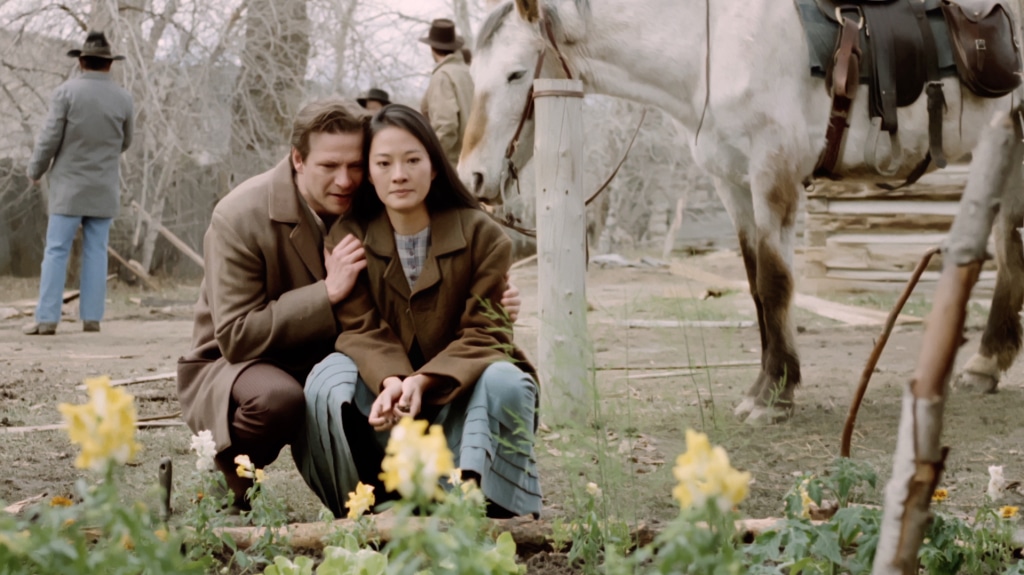Read also:
How to Watch FX Live Without CableHow To Watch AMC Without CableHow to Watch ABC Without CableHow to Watch Paramount Network Without CableNewly restored in 4K by Indiecollect and released by Kino Lorber, Nancy Kelly’s 1991 western softly explores racial and gender-based oppression in late-1800s America.
On the surface, Nancy Kelly’s Thousand Pieces of Gold appears to epitomize the issues of Western creators telling other cultures’ stories. Here, it’s a white woman adapting Ruthanne Lum McCunn’s 1981 novel of the same name. Kelly’s excellent picture initially seems to hint at an arc toward white savior territory and the flattened racism that’s plagued recent Hollywood attempts at grappling with bigotry. But soon, it reveals itself to be a much sharper riposte to the American idealism pervading these stories.
Beginning in Northern China in 1880, Lalu (Rosalind Chao) and her migrating family are beseeched by soldiers who steal their last sheep. Destitute and seeing no way forward for his family, Lalu’s father (Zhang Jianli) sells her into debt slavery, leading her into the hands of Jim (Dennis Dun), a Chinese-American wife-seller in San Francisco’s Chinatown district. Dun’s capricious performance underlines his mercenary social position. As a Chinese immigrant, he’s torn between his own ambitions and his growing personal connection to Lalu. Whether it’s through shared knowledge of Chinese constellation folklore or his instinct to protect her from white men who objectify her and her culture, he’s a man at war with his place in this culture.
Delivered to an unscrupulous Chinese-American saloon owner named Hong King (Michael Paul Chan) in small-town Oregon, Lalu is a slave in everything but name. Barely able to speak more than a dozen words of English, she’s othered around town as Hong King’s latest attraction for white men—and a stigmatized northerner to the Chinese side of town. The sole friendly faces are Jim, who alternates between dehumanizing and warning her to dissociate for her own safety; Berthe (Beth Broderick), a German woman who runs a boarding house; and Charlie (Chris Cooper), Hong King’s landlord. Charlie is the most immediately friendly of the group, his slick veneer cloaking a more complicated (and compelling) nature.

Even at its most politically crowd-pleasing, Kelly’s direction and Anne Makepeace’s script gurgle with frustration at the political and social realities. Lalu regularly faces the universal, unwritten rules of misogyny, but those prejudices double when combined with the racist foundations of the era.
That’s rarely more lucid than a chilling sequence where Lalu can be heard yelling and crying in the background as Hong King rapes her while the camera calmly pans around a card game involving Charlie, Jim, and a few other men at the saloon. The players are uncomfortable, but it’s clear this isn’t the first time they’ve been cowards. Hong King hopes this violation will prepare Lalu for prostitution but in an early show of her resilience, she smashes a mirror over a john’s head before threatening to slit his throat.
Angry at his failed plans, Hong King orders her to menial work. Working in the saloon day and night, Lalu only escapes the leering gaze of the townspeople when making trips to the Chinese section of town. Set against the lulling strums of the guzheng, these visits have a different tone as Lalu makes polite conversation with bystanders and finds comfort in the shop of a helpful doctor until she realizes Charlie also frequents this shop for a beard trim.
Even at its most politically crowd-pleasing, Kelly’s direction and Anne Makepeace’s script gurgle with frustration at the political and social realities.
DP Bobby Bukowski and director Kelly give a dim, windswept color to the film, shooting the town from cramped angles and in sidelong directions. These choices fully emphasize the setting’s nascent development and the geographical division between “homegrown” Americans looking to cash in on gold and Chinese-Americans immigrants who settled after being brought over to work on the railroad.
These sequences imply the possibility of a more organic assimilation, but they still come with the acknowledgement of a perpetual second-class citizenship. Consider it a comparable but less extreme texture to the qualified relationships of films like The Nightingale, or the selective isolation of The Piano. Umbrellaed as Mongolians by most, even those making gestures towards civility with the Chinese townspeople like Charlie assume a condescending loss in translation. Cooper is nothing short of galvanizing in the role. He’s a shadow of a familiar cinematic figure that’s nonetheless sabotaged by his own fragile nobility, a man neutered of the classical romanticism in the process.
But, for the first third, Charlie almost threatens to crowd Lalu out of her own film. Metaphorically befitting her growth, Chao’s character does eventually take center stage away from her captors, her performance reflecting her growing agency under colonial rule. In some ways, this dynamic puts Thousand Pieces of Gold in conversation with Jack Garfein’s Something Wild or even the bittersweet beauty of Gillian Armstrong’s Little Women. However, even those comparisons fixate on the arena of white expectation.
Instead, to say more of where the film does or doesn’t choose to go would betray its own subversions within a Hollywood format. It’s fair, then, to say that there’s not enough time spent within these more pivotal time jumps as relationships disintegrate and blossom in a way that a novel would have an easier time digesting. Rather, it’s more potent to conceptually say that racism is not so much rendered as a battle aided by the unaffected as it is its own rationalized reality of the times.
Thousand Pieces of Gold is now traversing virtual screening rooms across the country via Kino Marquee.